-
Posts
1,577 -
Joined
-
Last visited
Content Type
Profiles
Forums
Store
Help Articles
Posts posted by Dave Hatfield
-
-
Indefinitely if squeezed, fermented and bottled.
Just couldn't resist.
-
I too used to live in Spain way back when and Rotuts is correct in that the 'original' tortilla was made with only eggs, potato, onion and some olive oil. (don't think there was garlic, but I wouldn't swear to it.)
I think this was because the tortilla was very much a peasant dish and people used what they could grow or what was cheap. Not being strapped for cash I decided to 'fancy up' my modern version. Here's how I make mine.
Chop up onion & bell pepper into bite sized chunks.
Parboil some potato then cut it into bite sized chunks.
Put smoked lardons (or cut up thick cut bacon into chunks) into a frying pan with a bit of olive oil. Add the potato.
When the lardons are just starting to brown add the onion & bell pepper. Keep tossing everything so the it cooks relatively evenly.
Once the vegetables, potato & lardons are cooked add well beaten eggs. Tilt the pan around to distribute the egg evenly & cook for a few minutes.
Put the frying pan under a grill and cook the .top. When the top looks cooked and is lightly browned cut down into the tortilla to make sure its set all the way through. If not cook it some more on the stove top.
When done invert the pan over a serving platter & serve. It great either hot or cold. As there are only two of us I like to make a large tortilla & we eat half hot & save the other half to eat cold.
Naturally it needs to be salted & peppered up front & I like to add a good dose of Herbs de Provence.
Not at all traditional, but make a great meal and to my minds its one of the great egg based dishes!
Edited to correct typos
-
In addition to the 'classic' French omelettes shown so far one of your favourites is the type of omelette made in Spain.
They're called a tortilla (but are nothing like a Mexican tortilla). Typically they have potatoes, onion, bell pepper, lardons (bacon) , cheese. tomatoes and, of course eggs. They're very hearty and make a nice one course meal.
There's a recipe somewhere on my blog for those who care to look.
-
You asked about the meals served at farms in France.
They're called 'ferme Auberge' and there are lots of them.
http://www.bienvenue-a-la-ferme.com/recherche/index/restauration/2643/?q=&ferme_auberge=1. (click on the link at the top 'Voir les résultats sur la cart.) This is a link to one association of them. As you can see they're all over France.
Each one is different and usually they feature local products & cooking. One near us, for example, featured roast sanglier (wild pig). This farmer had fenced in a few acres and kept wild pigs there. We had soup, a starter, the main course, some cheese and dessert plus unlimited wine. The cost was reasonable.
Mostly they will be family style with everyone at one large table. Great for one's France and, usually, a lot of fun.
If on vacation in France I'd urge anyone to try one.
-
In France Table d'hotes is usually part of Chambre d'hotes. That is rooms for rent by the night. Its rare to see just the meal being offered.
Other, that is, than the farm meals that can be wonderful.
-
I find the recipe listed in eGullet's archives to be the best I've ever tried.
http://forums.egullet.org/topic/128617-passover-carrot-cake/?hl=%2Bcarrot+%2Bcake.
It never fails & people love it.
My only problem is convincing my French friends that it really does have a lot of carrot in it.
-
Ericpo
I wouldn't think you'd have a problem in Seattle.
I haven't lived in Seattle so can't give any advice, but I'm sure there are EGulleteers who do and can point you in the right direction.
I do know that Tilamook which is not a million miles from Seattle on the Oregon coast is home to some of the best cheddar type cheese in the states
-
Ericpo
All is not lost! Go on line, young man. go on line.
There are lots of cheese suppliers who sell over the internet. Just do a Google search.
Give it a try. You may have to shop around a bit to find out who is good.
-
I'm not too sure about the math here.
Current minimum wage is $7.25 an hour. If to get to that level you would have to raise the hourly rate by, say, 2.5X then you must currently be paying $2.90 an hour. Right?
Now if you have to raise prices by 20% then a !00.00 meal goes up to $120.00. This implies that since your labour rate has gone up by $3.35 an hour the labour content of the meal is roughly 5.5 hours. ($20.00/$3.35)
I don't really think so.
-
If I didn't have access to comfit duck I'd try doing some chicken thighs. Better yet if you have access to duck fat then do the chicken in that.
Because of the loss of flavour without the duck I'd make sure I used some lamb, shoulder braised with tomato & herbs first is best. This will add taste to your cassoulet.
Olney is right about the at least three varieties of cassoulet. I might add Cahors as well. But the surest way to get an argument or possibly a fight going is to ask the Frenchmen how to make cassoulet.
-
Try the Montignac diet. (Google it for details)
Very much like Atkins, but a sensible Atkins.
At heart no simple carbs, eat everything else.
Its worked for me for nearly 20 years and I'm a guy who likes to cook & eat.
-
If you don't like the tipping culture in the Us as you say then why don't you try to do something about it?
As an American living in Europe I'm no longer used to HAVING to tip in restaurants in the states. I do it when there because I know if I don't then my server will suffer as a result. I must say, however, that I hate doing it. Why can't American restaurants just pay their servers a decent wage and adjust their prices accordingly?
I strongly suspect that US restaurants which placed a clear and obvious statement on their menus saying that service was included and that any tip would be for above average service would do very well. They would not lose business because their prices were higher as most people are intelligent enough to understand that the total cost of a meal is what counts not the menu price plus 15% or more for the tip and resent having to pay a large tip.
Also, tipping flies against fundamental economics. Why should one pay 15% for a meal costing $20.00 per person and pay the same percentage for a meal that costs $100.00 per person? Has the waitperson who served the cheaper meal expended less time & energy? Five times less? I don't think so.
Your comparison of VAT to tipping is very naive. VAT is analogous to sales tax and thus trying to compare it to tipping is false. I don't much like VAT either, nor do I like sales taxes, but neither has anything to do with paying a person a decent wage for doing a decent job.
I'd love to see an anti-tipping movement in the US. I suspect that most US restaurant customers would as well. Probably so would most servers other than, perhaps, those who work in very high end restaurant.
-
Ok. I've read all the posts in this thread & I'm still not sure what wok to buy.
We have an induction stove top. I've seen some woks that purport to work on these, but I'm suspicious.
We do have a large gas BBQ which I'm sure would probably work, but that means going outside to cook. OK in summer, but not in winter.
I'm leaning towards an electric wok. This most powerful ones I can find are rated at 2200 watts. Enough power? Don't know how this translates into BTU's.
Also, any advice/ experience with non-stick coatings for woks. I can't find any high power electric one that don't have a non-stick coating.
I would appreciate any & all advice anybody can give me.
-
Agree that Trip Advisor offers the best chance of getting somewhat accurate reviews. Yes, its crowdsourcing, but one can read the individual reviews to see why the reviewers marked a place high or low.
Reading a few of these will give a pretty good idea of whether or not the reviewers know what they're talking aBOUT OR NOT.
-
Sunday lunch for only 6 of us, but a few cheeses anyway.
Here's the table setting. Linda always does such a nice job.
Here's the cheese board.
Individually the cheeses are:
Our old friend Cantal. Cows milk.
This is called a 'Brique Affinee' Its made from both milk & cream. Sort of a manufactured cheese that I thought I'd try.
Fourme d'Ambert. Pasteurized milk. Uses the Roquefort bacterium., but because its cows milk is much milder that Roquefort.
A goat's cheese, Mothais sur feuille. Raw milk. Its from the Poitue region South of Brittany & North of the Charante.
Maroilles. Cows milk from the far North of France. Picardy is its region. Ita very old type of cheese having been made for at least 1000 years.
Finally, Chaurce. A milk cows milk favorite and ones of Linda's favorites.
So as not to tease certain people I didn't take pictures of the three types of bread I bought this morning. Neither did I take pictures of the Pear Tatin I made yesterday evening.
I think this is going to be a nice Sunday lunch.
-
Great write up! You are bringing back fond memories of my first visit to Paris.
That was more years ago than I care to admit, but the charm of the city remains the same.
Can't wait for the next instalment.
-
According to Veronique (She & her husband have a truffle orchard near Lalbenque.) all you need do is to soften the butter enough so that the truffles will easily mix in, she uses best quality Normandy butter with sel de Gerond. then mix in your finely chopped fresh truffles. She freezes hers divided into about 3 inch long 'fingers'.
I've used her method and it works. Delicious with soft boiled eggs and toast coated in the truffle butter.
-
We had very good results by doing the grind first then removing the cutting blades when we were doing the stuffing.
-
Nice looking selection. Unless I miss counted you didn't name the cheese at the top left (11 O'clock to use your methodology).
If I'm right and it isn't named perhaps a friendly eGullet competition is in order.
NAME THAT CHEESE!
The prize being everlasting fame & glory on this forum.
I have a few ideas, but won't put them out quite yet.
-
Brie and Camembert are made in exactly the same way. The difference in France is that they come from different milks. In places other than France they often simulate a Brie by adding some cream to the milk before making. The double and triple bries simply have more cream added. Any of these cheeses should be matured such that the centre is soft (this is done by letting the mould on the rind extend its filaments to the centre of the cheese, it is also why the cheeses are of a uniform thickness in large or small wheels. There is a limit to the distance that the mould can extend its filaments. Too thick and you get a chalky interior. If these cheeses get too old, they develop an unpleasant ammonia smell in the rind.
Different breeds of cow and different areas. Normandy (Camembert) is further West, has more rain & thus richer pastures. Isle de France (Brie) is around Paris & thus somewhat drier. Also, the fact that Brie is made in large rounds whereas Camembert is made in small ones changes their flavour since in Camembert the mould can reach all the way to the centre of the round.
To be at their best both cheeses must be made from unpasteurised milk. This makes it difficult at times to get the real thing in the states.
With Brie you want to get a Brie de Meaux or a Brie de Melun if at all possible. With Camembert you need to try and find a Camembert de Normandy. In both cases these designations require that the cheese be made with unpasteurised milk.These are without question the two best varieties.
The 'industrial' varieties are hardly worth bothering with.
-
Good advice Dave, but it does rather depend on the ambient temperature where we live. We aren't all in France.
If I keep my cheese on the counter in summer it is going to hit around 40C (104ºF) and higher. Not the best option for my hard to come by cheese. It will be running down the street. Much better to keep it in the fridge and bring it up to temperature as needed.
most people who keep cheese in the frig when they don't have to don't understand cheese and have never had 'developed' cheese with crusty bread and red wine. the Troika of fermented foods that in moderation are probably very good for you. they also have cheese as an Hors Doover, which is fine, but does not realize cheese-potential.
BTW in FR do they eat that white 'rind' ? Ive forgotten. I sure do.
I hear you about the 40 degrees. In our part of France we too get up to 40 on some days & high 30's are not at all uncommon.
You just have to try & find a cool place somewhere in the house. We're lucky in that we have an old fridge (small one) up in the garage. We keep it turned up and use it to store both cheese and white wines.
chaqu'un a son gout! as they say. I've seen it both ways by the French; some eat the rind & some don't. Personally, I eat the rind on most soft cheeses.
-
I knew that cheese was talking to me !
best i can do, and its not bad is 'home aged' Blue Costello
http://en.wikipedia....astello_cheeses
I find cheese 'left out, covered' for a few days improves the taste dramatically. my kitchen never gets above 60 F in the winter.
at least this works for 'full flavored' cheese Yummy yellow tinge.
cheese a Joe;s runs about 4 - 6 $$/lbs cheaper than other local markets !
Gosh doesn't everybody keep their cheese out of the fridge? I think keeping them there may be a prison offence in France.
I'm exaggerating, but one ideally should keep cheese at around 45-50 degrees F. The fridge is just too cold and kills flavour. This is especially true for soft cheeses. I remember a friend who said he couldn't see what all the fuss about Camembert was about. He thought it didn't have any taste. I advised two days in a cool garage at about 50 F. After that when he tasted it he appreciated what all the fuss was about.
So, please,please don't kill your cheeses with cold. If you don't have a good place to store them at the right temperature then at least take them out of the fridge a day or two before eating. .
-
You'd like it as its not too far off the taste of the Domain de Bresse we discussed a while ago.
Its a Bleu d'Auvergne. Very creamy & mild for a blue.
Alsace I won't mention the Gaillac, Minervois and Bordeau wines or the Crement de Alsace we had with nibbles. No use being sadistic is there?
-
We're hosting a dinner for all the members of our local wine tasting club this evening and naturally there will be a cheese course.
Here it is:
We're particularly blessed this evening as we have three cheeses from our friend Jacques on the plate. He's from the Auverne where they make some truly great cheese. Our favourite of this lot is the mild blue.
In addition there's some cantal entre deux and some St Felecien.
Finally, just because a certain member keeps asking there's a picture of the bread we'll have with the cheese.



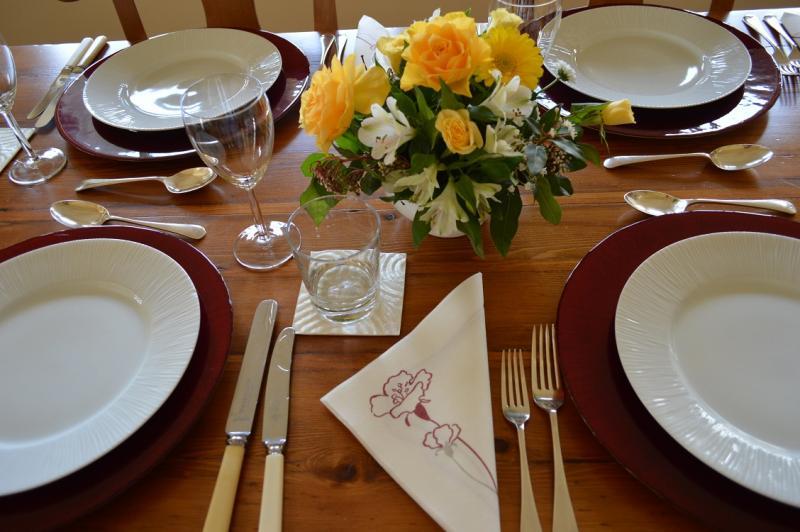
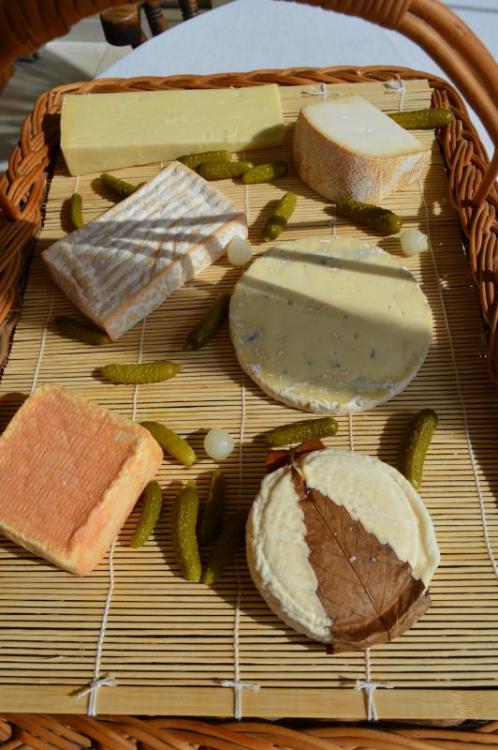
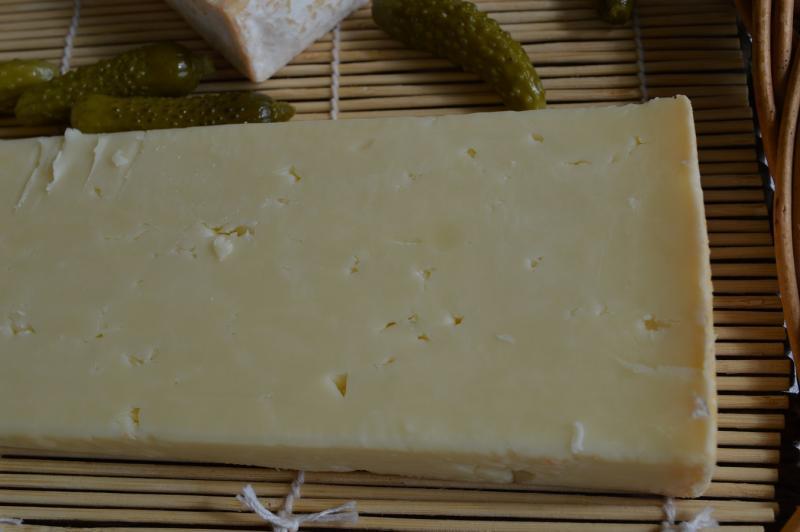
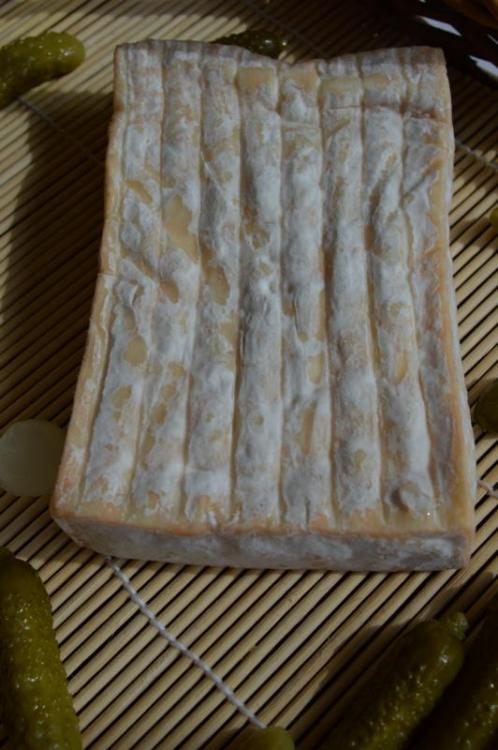
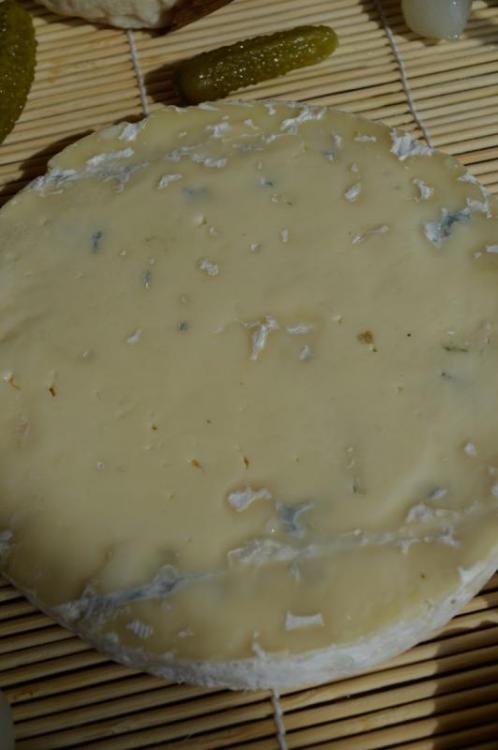
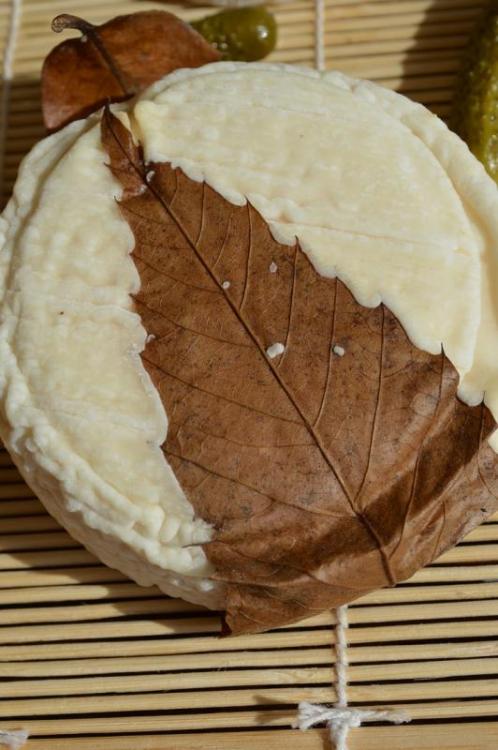
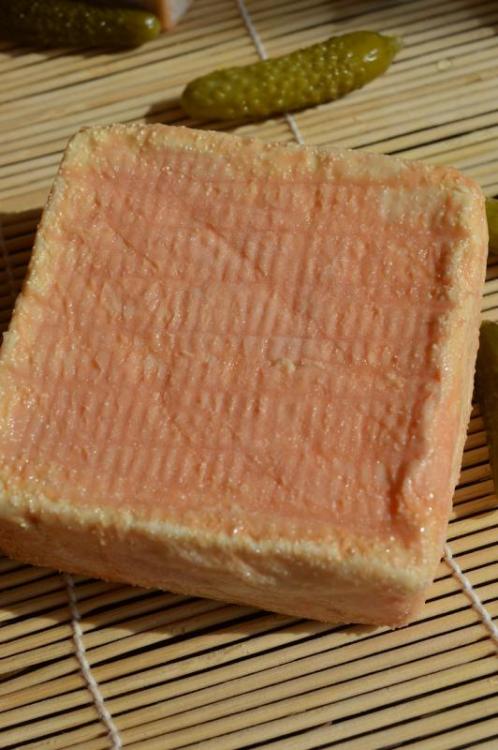
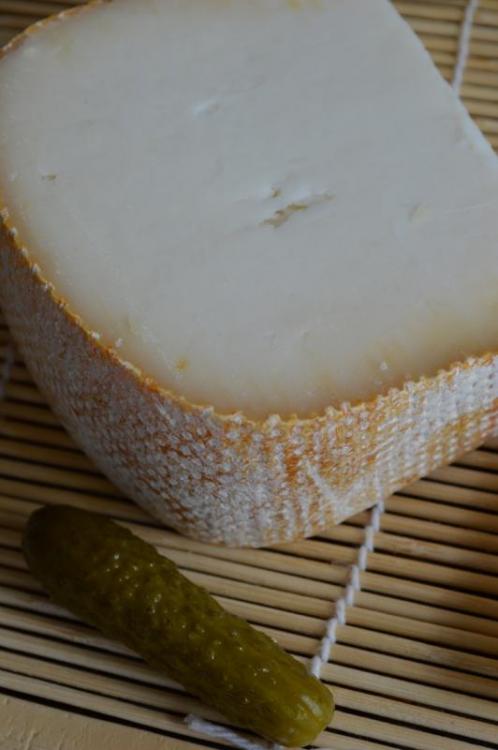
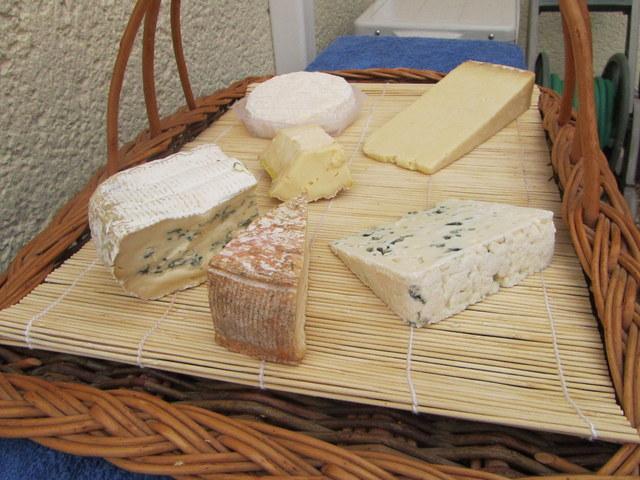
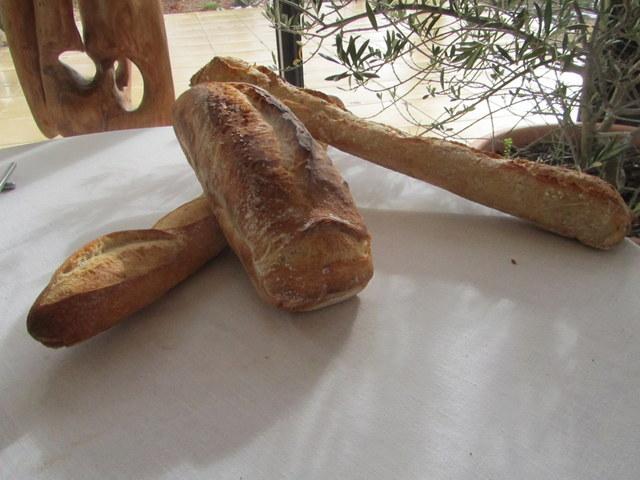
DIY sun dried tomatoes?
in Cooking
Posted
Keith is right. Do them in the oven.
1) Set oven temperature to 140 C. You may have to slightly prop open the door.
2) Cut tomatoes in half & remove the seeds. I find that Roma tomatoes work best.
3) sprinkle with a bit of salt, some Herbs de Province or thyme or whatever herb you like best.
4) put them onto a baking tray. Flat with no overlap.
5) bake. Usually 3-4 hours, but the key is to dry them until they feel 'leathery'. Dry, but still flexible.
I like to then put them into canning jars with olive oil, a bit of garlic & some more herbs, but that's just my preference. They will keep pretty well sealed in ziplocks & kept in the proverbial cool dry place.
I made lots last year & sold them at a charity auction my wife was running. Made nearly $200.